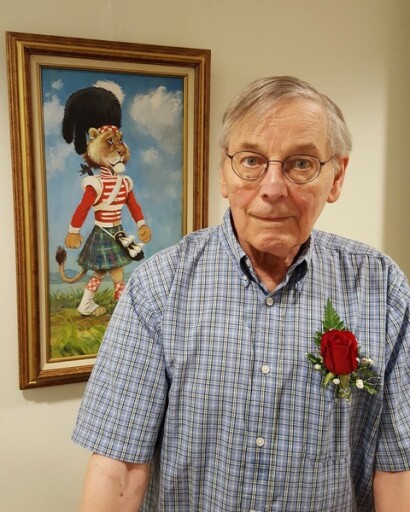

Wallace Tripp
June 26, 1940 — September 9, 2018
Francestown
Wallace Whitney Tripp, 78, passed away in Francestown, NH on September 9, 2018, after a three-decade struggle with Parkinson’s disease. Tripp was a children’s book illustrator who had a brief but productive career, ultimately illustrating some thirty-nine children’s books for other authors, and nine books of his own, as well as creating hundreds images for Pawprints Greeting Cards.
Tripp started his career in children’s books; popular titles include “Stand Back,” Said the Elephant, “I’m Going to Sneeze!”, A Great, Big, Ugly Man Came Up and Tied His Horse to Me, Sir Toby Jingle’s Beastly Journey, and two books in the Amelia Bedilia series. His pen-and-ink and watercolor style of drawing was meticulous and classical, but his love of comic book art kept subjects lively. Tripp specialized in anthropomorphic animals, often dressed in carefully researched period costumes. He admired the story telling of illustrator Ernest Shepard, the linework and spirit of T.S. Sullivant, and the swagger of J.C. Leyendecker and John Singer Sargent. Many of his early works were color-separated by hand on acetate sheets, often with only two or three colors to work with; when photo reproduction became common, he added transparent watercolors to his ink work, resulting in classic books such as Granfa Grig Had a Pig and Other Rhymes without Reason, which won the Horn Book Award in 1977, and Marguerite, Go Wash Your Feet. Tripp created characters for Richard Purdum’s animation studio in London, resulting in award-winning animated commercials for British television. His final book, Rose's Are Red, Violet's Are Blue and Other Silly Poems was drawn with both ink and watercolor, and with colored pencil, as he had increasing difficulty handling an ink pen due to his advancing Parkinson’s disease.
Originally from Boston, Massachusetts, Tripp’s family moved to New York and later New Hampshire, where he would live most of the rest of his life. He studied art at the Boston Museum School, studied English at Keene State College, and briefly taught English before turning to art full-time. He married Marcia Bixby Tripp in 1965; his first words to her were “Greetings, my name is Vladimir Hook.” They had three children together who would all become artists; son Benjamin Whitney is a novelist, daughter Loren Avery is a set designer, and son Samuel Sparhawk is a musician.
An art and history enthusiast, Tripp and his family moved to Tavistock, England in 1973 and traveled Europe for some time thereafter, living in a Volkswagen camper, a guardhouse in the city wall of Assisi, Italy, and assorted other places. Travel in search of history would remain a fixture in his life; it is believed that he visited every extant castle in Britain and Wales.
In 1975, Tripp’s parents Kenneth and Francis founded Pawprints Greeting Cards. Later, wife Marcy grew the company into one of America’s leading card publishers, adding gifts, calendars, and other products to the lineup. Wally would illustrate over 600 greeting cards for Pawprints. Marcy founded Sparhawk Books in 1980, which published Wallace Tripp’s Wurst Seller, a compilation of nonsense poetry and visual puns, and Bad Child’s Book of Beasts, which was also published as a pop-up book.
When he wasn’t supposed to be drawing, and often when he was, Tripp loved to build and crash model airplanes. He also learned to fly real aircraft and piloted a Piper Archer (tail number 2910G.) He was a passionate fan of classical music and spent the 1980s investing in ever-more powerful stereo systems which could be heard from miles away on a still New Hampshire afternoon. Medieval history, collecting antique toys and E.C. comic book art, and reading about classical composers rounded out his time.
His sense of humor is legendary. He felt the antidote to cruelty was laughter, and his love of all things ridiculous (From Chaucer to the Goon Show) propelled him through every event in life. Anyone who knew him will remember his high-pitched giggle; he went into hysterics at the premier of Blazing Saddles, fell into the aisle, and had to be helped back into his seat. Constructing elaborate puns and reading aloud from volumes of nonsense verse were staples at the family dinner table.
Tripp was diagnosed with Parkinson’s disease in 1986. He swiftly lost the use of his right hand, and learned how to draw with his left in order to keep working. In 1994 the Tripps moved to Southern California to be near their grandchildren. Due to his increasing disability, 1999 Marcy and Wallace officially closed Pawprints, licensing the card rights to Recycled Papers. Daughter Loren re-opened Pawprints in 2015 and plans to bring back Tripp’s work to loyal fans and a new audience via an online print-on-demand service.
In 2001 Tripp received deep brain stimulation implants to override the worst symptoms of Parkinson’s, a device which, with annual battery changes, operated until his death and earned him the moniker “Cyborg Grampa.” This device, along with medication, a daily commitment to exercise, and dedicated caregivers, kept him functioning for years past his due date. With his health stabilized, and divorced, he returned to New Hampshire in 2007. There Tripp rediscovered his high school sweetheart Rita Ludwig Farhm. They remained happily together for eight years until his death at her home in Francestown, NH, where he was surrounded by loving friends, family, and two cats. Tripp is survived by Marcy, Rita, his children, his brothers Steve and David, and three grandsons Ian J. S. Tripp, a film maker, and Peter and Quincy Ryan, both musicians.
The family is grateful for the loving care given to Wally by the staff and residents of Scott-Farrer and Pheasantwood in Peterborough, and the nurses of Compassus and Brightstar hospice. A memorial service is planned for June at his Pleasant Pond cabin. In lieu of flowers, the family ask that donations be sent to the Michael J. Fox Foundation for Parkinson’s Research.
Photo Gallery
Guestbook
Visits: 26
This site is protected by reCAPTCHA and the
Google Privacy Policy and Terms of Service apply.
Service map data © OpenStreetMap contributors



